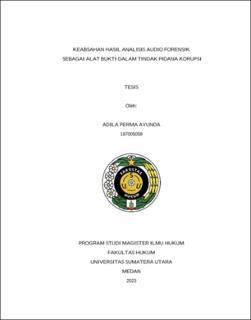Keabsahan Hasil Analisis Audio Forensik sebagai Alat Bukti dalam Tindak Pidana Korupsi
Validity of Forensic Audio Analysis Results as a Tool of Evidence in Corruption Crime

Date
2023Author
Ayunda, Adila Perma
Advisor(s)
Syahrin, Alvi
Yunara, Edi
Ekaputra, Mohammad
Metadata
Show full item recordAbstract
Audio forensics is used to analyze voices to show ownership of voices, which can see clearly on the occurrence of a crime and will eventually be used as evidence. Proof of a crime will always be related to the existence of evidence. The function of the evidence itself is to prove whether or not someone committed a crime. By carrying out an audio forensic analysis correctly, the results of the audio forensic analysis of the sound can be used as evidence. With the formulation of the problem, How to regulate the results of forensic audio analysis as evidence in corruption crimes?, How is the evidentiary power of forensic audio analysis results as evidence in corruption crimes?, and What are the barriers to proving the results of forensic audio analysis as evidence in corruption crimes?
The research method used in writing this thesis is a normative juridical legal research method which is descriptive analytical by conducting library research to obtain the required secondary data, including primary, secondary and tertiary legal materials related to the problem. All data was collected using library research and field research data collection methods.
Based on the results of the research, it shows that the results of forensic audio analysis as evidence in corruption crimes have power after sound analysis is carried out with the stages used in accordance with Standard Operating Procedure (SOP) 12 concerning Audio Forensic Analysis from the Digital Forensic Analyst Team (DFAT) Puslabfor namely Acquisition, Audio Enhancement, Decoding, Voice Recognition. By carrying out these steps, scientifically demonstrating the ownership of the votes in the recording so that it has the strength of evidence to be presented as valid evidence and is an extension of the evidence in the Criminal Procedure Code in force in Indonesia, provided that electronic information and/or electronic documents are in accordance with the provisions stipulated in Law Number 11 of 2008 concerning Information and Electronic Transactions based on Article 5 paragraph (3) in conjunction with Article 6 Number 11 of 2008 concerning Information and Electronic Transactions. Corruption crimes are regulated in Article 26 A of Law Number 20 of 2001 regarding amendments to Law Number 31 of 1999 concerning Eradication of Corruption Crimes.
Collections
- Master Theses [1848]
